Kenneth C. Davis's Blog, page 59
May 8, 2017
Don’t Know Much About® Harry S. Truman
Harry Truman “Gave’ Em Hell.” I gave him a A. Born on May 8, 1884, the 33rd President of the United States.
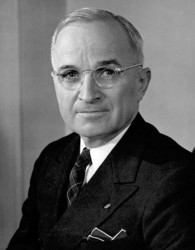
President Harry S. Truman
(Photo: Truman Library)
It was on his birthday in 1945 that Truman was able to tell Americans that the war in Europe was over with the surrender of Germany.
THIS IS a solemn but a glorious hour. I only wish that Franklin D. Roosevelt had lived to witness this day. General Eisenhower informs me that the forces of Germany have surrendered to the United Nations. The flags of freedom fly over all Europe. For this victory, we join in offering our thanks to the Providence which has guided and sustained us through the dark days of adversity.
Described as “a minor national figure with a pedestrian background,” Truman was a World War I veteran and a Senator from Missouri when Franklin D. Roosevelt chose him to become his running mate in the 1944 election. Truman became vice president when FDR won his fourth term and then took office on April 12, 1945 when FDR died.
When he took office, Truman had been largely left “out of the loop” by Roosevelt as World War II entered its final months. Truman did not know of the existence of the “Manhattan Project” and the development of the atomic bomb until he became president. Then he had to make the decision to use it against the Japanese.
Fast Facts
•Truman was a member of the Sons of the Revolution and the Sons of Confederate Veterans
•He wanted to attend West Point but poor eyesight kept him out. He enlisted in the Missouri National Guard and served as the commander of an artillery battery in World War I.
•Before entering politics, he was a farmer, bank clerk, insurance salesman and owner of a failed haberdashery store.
•As president he once threatened to punch the nose of a newspaper critic who had given his daughter a poor review after her debut singing recital. Margaret Truman went on to greater fame as a mystery novelist, beginning with Murder in the White House published in 1980.
•After Grover Cleveland, Truman is the only president who did not attend college. He attended law school briefly but dropped out.
After the end of World War II, Truman had to shift America’s attention to the new “Cold War” with the Soviet Union and his policies of “containment” and the Marshall Plan to rebuild war-torn Europe were hallmarks of his presidency.
Harry S. Truman died on December 26, 1972. This is his New York Times obituary. The Truman Library and Museum is located in Independence, Missouri
Read more about Truman, his life and administration in Don’t Know Much About® the American Presidents. Truman is also featured in the Berlin Battle chapter of The Hidden History of America at War.
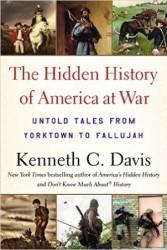
In paperback May 2016 THE HIDDEN HISTORY OF AMERICA AT WAR: Untold Tales from Yorktown to Fallujah
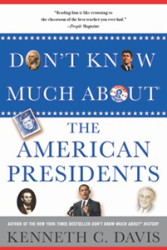
Don’t Know Much About® the American Presidents (Hyperion paperback-April 15, 2014)
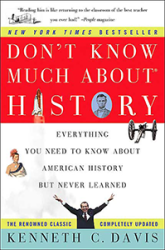
Don’t Know Much About® History: Anniversary Edition (Harper Perennial and Random House Audio)
April 10, 2017
Who Said It? (4/10/17)
–President Thomas Jefferson
Letter to the Danbury Baptist Association, (January 1, 1802)
Thomas Jefferson was born on April 13, 1743

Thomas Jefferson, third president (Source: White House)
Believing with you that religion is a matter which lies solely between man and his God, that he owes account to none other for his faith or his worship, that the legislative powers of government reach actions only, and not opinions, I contemplate with sovereign reverence that act of the whole American people which declared that their legislature should “make no law respecting an establishment of religion, or prohibiting the free exercise thereof,” thus building a wall of separation between church and State. Adhering to this expression of the supreme will of the nation in behalf of the rights of conscience, I shall see with sincere satisfaction the progress of those sentiments which tend to restore to man all his natural rights, convinced he has no natural right in opposition to his social duties.
–Thomas Jefferson
Letter to the Danbury Baptist Association, (January 1, 1802)
Full text from the Library of Congress
Read more about Jefferson and his life in this post, “Happy Birthday, Mr. Jefferson”
Happy Birthday, Mr. Jefferson
(Revision of April 13, 2012 post)
That these are our grievances which we have thus laid before his majesty, with that freedom of language and sentiment which becomes a free people claiming their rights, as derived from the laws of nature, and not as the gift of their chief magistrate: …. (Kings) are the servants, not the proprietors of the people. Open your breast, sire, to liberal and expanded thought. Let not the name of George the third be a blot in the page of history.
–Thomas Jefferson
A Summary View of the Rights of British America (1774)
Born on April 13, 1743 at Shadwell, his father’s estate in Albermarle County, Virginia, Thomas Jefferson was the son of a planter and surveyor, Peter Jefferson and his wife, Jane Randolph Jefferson, who came from the Randolphs, one of Virginia’s wealthiest families. Thomas Jefferson’s father had moved the family to the Tuckahoe plantation owned by William Randolph, which Peter Jefferson managed as executor. The third child in a family of ten, Thomas was a bookish boy who studied with a local clergyman and later at a school in Fredericksburg with Reverend James Maury who taught Jefferson the classics in their original languages. The oldest son, Thomas was fourteen when his father died, leaving the boy head of an estate with about 2,500 acres and thirty slaves.
The Declaration’s author distinguished himself early as a scholar at The College of William and Mary, and gained admission to the Virginia bar in 1767. His literary prowess, demonstrated in A Summary View of the Rights of British America, prompted John Adams to put Jefferson forward as the man to write the Declaration, a task he accepted with reluctance.
Most of the war years were spent in Virginia as a legislator and later as governor, a period of some controversy as he was criticized for failing to aggressively defend Virginia against British attacks.
After his wife’s death, in 1783, he joined the Continental Congress and served as ambassador to France, where he could observe firsthand the French Revolution. Returning to America in 1789, Jefferson became Washington’s secretary of state and began to oppose what he saw as a too-powerful central government under the new Constitution, bringing him into a direct confrontation with his old colleague John Adams and, more dramatically, with the chief Federalist, Alexander Hamilton.
Running second to Adams in 1796, he became vice president, chafing at the largely ceremonial role. In 1800, Jefferson and fellow Democratic-Republican Aaron Burr tied in the Electoral College vote, and Jefferson took the presidency in a tense and controversial House vote that required more than 30 ballots.
While President, Jefferson engineered the Louisiana Purchase and wrote what may be his second most famous lines in a letter addressing religious freedom under the new American government.
Believing with you that religion is a matter which lies solely between man and his God, that he owes account to none other for his faith or his worship, that the legislative powers of government reach actions only, and not opinions, I contemplate with sovereign reverence that act of the whole American people which declared that their legislature should “make no law respecting an establishment of religion, or prohibiting the free exercise thereof,” thus building a wall of separation between church and State. Adhering to this expression of the supreme will of the nation in behalf of the rights of conscience, I shall see with sincere satisfaction the progress of those sentiments which tend to restore to man all his natural rights, convinced he has no natural right in opposition to his social duties.
–Thomas Jefferson
Letter to the Danbury Baptist Association, (January 1, 1802)
After two terms, he returned to his Monticello home to complete his final endeavor, building the University of Virginia. As he lay dying, Jefferson would ask what the date was, holding out, like John Adams, until July 4, 1826, the fiftieth anniversary of the Declaration.
With the advantage of hindsight, cynicism about Thomas Jefferson is easy. But the baffling question remains: How could a man who embodied the Enlightenment keep black slaves –and it is widely assumed, father children by one of them?
There is no truly satisfying answer. Earlier in his life, as a lawyer and member of the Burgesses, he had unsuccessfully argued against aspects of slavery. At worst, Jefferson may not have thought of slaves as men, not an unusual notion in his time. And he was a man of his times. He was completely dependent upon slavery for his financial life and the political power of his southern slave-holding class. Like other men, great and small, he was not perfect.
Jefferson’s life, writings and politics are discussed in Don’t Know Much About History from which this material is adapted. His relationship with the enslaved people of Monticello is explored in In the Shadow of Liberty.

Jefferson’s Gravesite Photo credit: Kenneth C. Davis ©2012
March 21, 2017
C-Span Book videos
Kenneth C. Davis talked about his book, The Hidden History of America at War, about the challenges the U.S. military faced from the Revolutionary War to the War in Iraq. Mr. Davis also argued that there are many popular misconceptions about the American Revolution, and the Civil and Vietnam Wars.
The Hidden History of America at War
Kenneth C. Davis talked about his book, The Hidden History of America at War: Untold Tales from Yorktown to Fallujah. He spoke with Mark Jacob, author of 10 Things You Might Not Know About Nearly Everything.
“Don’t Know About History” took place in the north auditorium of Jones College Prep High School at the 2015 Chicago Tribune Printers Row Lit Fest.
The program concluded with scenes of the book festival and schedule information.
In Depth with Kenneth Davis
Author Kenneth Davis talked about his body of work and his newest book, Don’t Know Much About the American Presidents. He answered questions from viewers via telephone and electronic communications. Mr. Davis was also the author of eight other books in the Don’t Know Much About… series as well as the book, America’s Hidden History.
America’s Hidden History
Kenneth Davis, author of America’s Hidden History: Untold Tales of the First Pilgrims, Fighting Women, and Forgotten Founders Who Shaped a Nation (Collins; April 29, 2008), talked about his book at the 2008 National Press Club Book Fair.
March 19, 2017
In the Shadow of Liberty- A Finalist for Yalsa’s Excellence in Nonfiction Award
IN THE SHADOW OF LIBERTY: THE HIDDEN HISTORY OF SLAVERY, FOUR PRESIDENTS, AND FIVE BLACK LIVES was a finalist for the 2017 Award for Excellence in Young Adult Nonfiction by YALSA –the Young Adult Library Service Association of the American Library Association.
YALSA’s Award for Excellence in Nonfiction honors the best nonfiction book published for young adults (ages 12-18) during a Nov. 1 – Oct. 31 publishing year.
The nomination reads:
In the Shadow of Liberty: The Hidden History of Slavery, Four Presidents, and Five Black Lives by Kenneth C. Davis, and published by Henry Holt, an imprint of Macmillan Children’s Publishing Group
“In a clear-eyed, well-researched work, Davis looks at the relationship between five enslaved persons and the former presidents who considered them property. In weaving together the story of these lives, Davis explains the contradiction between America’s founding ideals and the harsh reality of human bondage. Utilizing personal narratives, census data, images, and other primary source material, this book explains a heartbreaking chapter in American history that is both fascinating and deeply disturbing.”

March 16, 2017
A different Irish parade in New York-Orange Day
As New York prepares for the St. Patrick’s Day parade, here is another reminder of the past view of the Irish–especially Irish Catholics– in America: the Orange Riots of 1870 and 1871.

The Orange Riot of 1871 as depicted in Frank Leslie’s Illustrated Newspaper. The view is at 25th Street looking south down Eighth Avenue (Source Wikipedia: https://en.wikipedia.org/wiki/Orange_...)
Long before the nation’s birth, anti-Catholic venom was an accepted American truism –a deep divide with roots in Europe’s deadly wars between Catholic and Protestant. The hatred of all things Roman Catholic was part of America’s Puritan and Protestant roots. In 1844, Philadelphia had been raked by anti-Catholic violence known as the “Bible Riots,” subject of a previous post.
By the middle of the 19th century, waves of Irish immigrants had magnified the hatred and transformed New York’s politics. Political boss William Tweed used their votes to secure power for Tammany Hall and himself. But the growth of Irish Catholic power in New York only deepened ancient animosities.
New York’s virulent anti-Catholic sentiment peaked with the largely overlooked “Orange Riots” of 1870 and 1871. In the first of these, Irish Protestants marched in celebration of the July 12, 1690 victory of the Protestant King William III over Catholic King James II at the Battle of the Boyne. Taunting Irish Catholic workmen as they paraded up Eighth Avenue, the Protestant “Orangemen” went to a park where a pitched battle ensued.
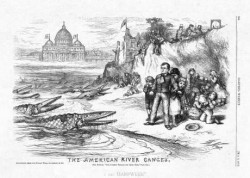
Thomas Nast’s Anti-Catholic cartoon “The American River Ganges snd the Children” Harpers’Weekly September 30, 1871
Eight people died.
Another “Orange Day” march planned in 1871 was nearly banned for public safety reasons. But prominent businessmen and cartoonist Thomas Nast objected vehemently to this affront to Protestant rights. With Boss Tweed guaranteeing protection for the marchers, the 1871 parade stepped off, guarded by some 5,000 policemen and National Guard militia units.
Almost immediately, the marchers were pelted with bottles, bricks, shoes and stones. Pitched battles continued along the parade route. When it was over, the rioting and street-fighting left sixty people dead, most of them Irish Catholic laborers as well as three Guardsmen.
The bloodshed of these “Orange Riots” and Tweed’s failure to secure the parade were crucial factors in breaking his stranglehold on New York politics and government. The city’s newspapers and largely Protestant-controlled business and financial world turned on him. Tweed was deposed, eventually arrested, and later convicted of corruption.
Anti-Irish sentiment in New York and elsewhere continued for decades.
Don’t Know Much About® Mr. Madison
March 16 marks the anniversary of the birth of America’s fourth President, James Madison, also known as “The Father of the Constitution.”
While small in stature, and sometimes overshadowed by his more famous Virginian predecessors, George Washington and Thomas Jefferson, Madison is generally considered one of the greatest of the Founding Fathers for the breadth and influence of his contributions. Like many of the Founders, Madison had reservations about slavery as a contradiction to this ideals, but did little to end the institution. He hoped that slavery would end after the foreign trade was abolished and thought that enslaved African-Americans should be emancipated and returned to Africa.
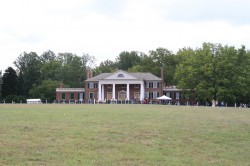
Montpelier, home of James Madison (Photo: Kenneth C. Davis, 2010)
James Madison was born on March 16, 1751 in Port Conway, Virginia. The son of a tobacco planter, he chose the unusual course of going north to study at the College of New Jersey (now Princeton). There he came under the influence of the college President, John Witherspoon, a future signer of the Declaration of Independence, and made a friend of fellow student, young Aaron Burr, son of the College’s founder.
Returning to Virginia, Madison became involved in patriot politics and became a close colleague of his neighbor Thomas Jefferson, serving as Jefferson’s adviser and confidant during the war years while Jefferson was Governor of Virginia.
In 1794, he married the widow Dolley Payne Todd, having been formally introduced by his college friend Aaron Burr.
A few Madison Highlights–
•Secured passage of the Virginia Act for Establishing Religious Freedom (1786), an act that is a cornerstone of religious freedom in America. As part of that effort, he wrote the influential Memorial and Remonstrance Against Religious Assessments. (I discuss the “Remonstrance” in my article “America’s True History of Religious Tolerance” in the October 2010 Smithsonian.)
•Was the moving force behind the Constitutional Convention and was one of the principal authors of the Constitution. Madison’s support of the electoral system is laid out in this essay by Yale professor Akhil Reed Amar “The Troubling Reason the Electoral College Exists.”
•With Alexander Hamilton and John Jay was one of the authors of The Federalist Papers, arguments in favor of the ratification of the Constitution
•Was principal author of the Bill of Rights, which he originally thought unnecessary
Following ratification of the Constitution, Madison was a member of the House of Representatives from Virginia and a powerful Congressional ally of George Washington.
•Drafted the first version of Washington’s Farewell Address
•Supervised the Louisiana Purchase as Thomas Jefferson’s Secretary of State
•Presided over the ill-prepared nation during the War of 1812, the “second war of independence”
I believe there are more instances of the abridgment of the freedom of the people by gradual and silent encroachments of those in power than by violent and sudden usurpations. –June 16, 1788
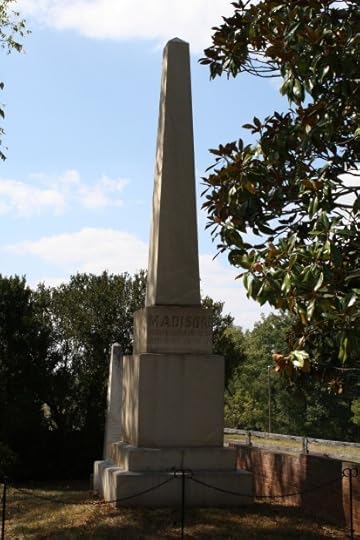
Madison’s grave at Montpelier (Author photo 2010)
Madison died on June 28, 1836 at Montpelier, at age 85. He is buried at Montpelier.
The story of Paul Jennings, who was enslaved by Madison and wrote a memoir of working as a servant in the White House, is told in my recent book IN THE SHADOW OF LIBERTY.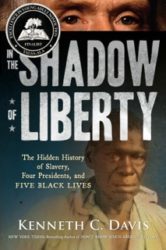
LINKS:
The White House brief biography of James Madison
The Library of Congress Resource Collection on James Madison.
Madison’s Major Papers and Inaugural Addresses can be found at the Avalon Project of the Yale Law School.
March 15, 2017
Don’t Know Much About® Andrew Jackson

Imacon Color Scanner
(Revision of original post of March 15, 2014. Video created and directed by Colin Davis.)
Andrew Jackson, the 7th President of the United States, was born on March 15, 1767 on the border of both South and North Carolina (the precise location is uncertain).
When this was last posted, he had fallen from favor and was going to be moved to the back side of the $20 in favor of Harriet Tubman. But with a new president, comes
In his day and ever since, Andrew Jackson has inspired high emotions and sharp opinions. Thomas Jefferson once called him, “A dangerous man. ”
His predecessor as president, John Quincy Adams, a bitter political rival, said Jackson was,
“A barbarian who could not even write a sentence of grammar and could hardly spell his own name.”
His place and reputation as an Indian fighter began with a somewhat overlooked fight against the Creek nation led by a half-Creek, half-Scot warrior named William Weatherford, or Red Eagle following an attack on an outpost known as Fort Mims north of Mobile, Alabama. Like Pearl Harbor or 9/11, it was an event that shocked the nation. Soon, Red Eagle and his Creek warriors were at war with Andrew Jackson, the Nashville lawyer turned politician, who had no love for the British or Native Americans.
You know the name of Andrew Jackson. But you probably don’t know the name William Weatherford. You should. He was a charismatic leader of his people who wanted freedom and to protect his land. Just like “Braveheart,” or William Wallace, of Mel Gibson fame. Only William Weatherford, or Red Eagle, wasn’t fighting a cruel King. He was at war with the United States government. And Andrew Jackson. This video offers a quick overview of Weatherford’s war with Jackson that ultimately led the demise of the Creek nation.
Andrew Jackson died on June 8, 1845. He was surrounded by many of the household servants he had enslaved. He told them:
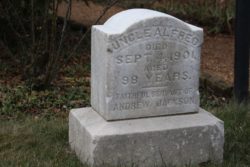
Tombstone of Alfred Jackson, enslaved servant of Andrew Jackson. (Author photo © 2010)
“I want all to prepare to meet me in heaven….Christ has no respect to color.”
The story of one of those people, Alfred Jackson, is told in my recent book, In the Shadow of Liberty. Alfred Jackson is buried in the garden at the Hermitage, near Andrew Jackson’s gravesite.


Don’t Know Much About® History: Anniversary Edition (Harper Perennial and Random House Audio)
March 14, 2017
Whitney’s Cotton Gin
On March 14, 1794, Eli Whitney received a patent for his cotton gin. This Ted Ed lesson explains what happened next.
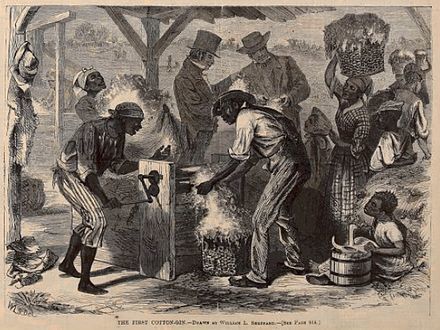
Harpers’ Weekly: “The first cotton gin” Image: Library of Congress Prints and Photographs division digital ID cph.3c03801.
The cotton gin helped spur demand for cotton and the enslaved labor needed to plant, harvest, and clean it.
Read more in
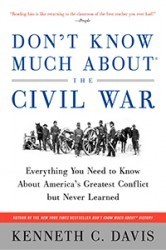
Don’t Know Much About the Civil War (Harper paperback, Random House Audio)
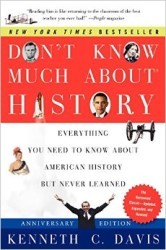

March 13, 2017
Who Said it? (3/13/2017)
Answer: James Madison, Letter to R. H. Lee, July 17, 1785
Another of my wishes is to depend as little as possible on the labour of slaves.
— James Madison, Letter to R. H. Lee, July 17, 1785
Source: “What the founders said about slavery” George Mason University
James Madison was born on March 16, 1751.
Like many of the Founders, Madison had reservations about slavery as a contradiction to this ideals, but did little to end the institution. He knew that the three-fifths compromise that allowed for the counting of the enslaved would be significant in maintaining the power of the slaveholding states. Madison hoped that slavery would end after the foreign trade was abolished –in 1808– but believed that enslaved African-Americans should be emancipated and returned to Africa — a policy known as “Colonization.”
Madison’s support of the electoral system and the advantage it gave slaveholding states is laid out in this essay by Yale professor Akhil Reed Amar “The real reason the Electoral College Exists.”
James Madison’s Montpelier has recently posted this article: “Slavery, the Constitution, and a Lasting Legacy.
Read more about Madison in these books:
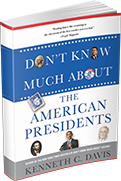
Don’t Know Much About® the American Presidents (Hyperion Paperback-April 15, 2014)




